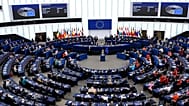 ADVERTISEMENT
ADVERTISEMENT
Right On reporter Anne Devineaux traveled to Paris and Brussels to assess the impact the digital age is having on individual privacy, she poses a simple but potent question: “Is it still possible to protect our privacy in the digital age? Edward Snowden’s revelations about the extent of US cyber surveillance has sent shockwaves across Europe. All our internet activity is monitored and stored by states and private companies.”
Jérémie Zimmermann, a founding member La Quadrature du Net, a group set up to protect individual privacy, told euronews: “It will take a lot longer for the magnitude of these revelations to impact on our society and on our relationship with power and our relationship with technology.”
For months the scandal surrounding the Prism program has raged. Under the guise of anti-terrorism the National Security Agency (NSA) collected, via the US net giants, the personal data of millions of citizens worldwide, a massive, menacing and indiscriminate collection.
Beyond the diplomatic fallout the revelations have opened up a debate on the major issue of our time. The mass production of data via the net, known as Big Data, for Big Data read Big Brother.
Jérémie Zimmermann, is concerned by the power the main US net players hold: “Their technological and economic models are based on the maximum data collection globally. This centralisation of data forms the pillar of mass surveillance.”
However, alternatives do exist say activists. One example is the search engine DuckDuckGo, which does not store personal information. A vital component is a change in attitudes. Activists reject the misleading trend of the split between the computer masters and the ordinary world.
La Quadrature du Net’s Jérémie Zimmermann explained: “On the one hand hand there is the product that comes in a box, it is easy, simple, user friendly and the other stuff in white letters on black screen, stuff you are not expected to understand. There is the technology you control and the technology you have the potential to control. This has to be studied, learned. I’m convinced that in the 21st Century not knowing where one’s data is or ignorance of the architecture of the communication system will be akin to illiteracy. We will be signing contracts we cannot read and don’t understand.”
In Europe the protection of privacy is considered a fundamental right. In each country a public authority is responsible for protecting it. In France it is the French Data Protection Authority, the Commission Nationale Informatique et Liberté (CNIL).
Its president, Isabelle Falque-Pierrotin, refuses to accept the scandal is a failure of the national supervisory authorities. She is calling for a clear political and legal response at a European level: “If there was a failure, it was that Europe didn’t react quickly to the Prism case. So I think it will kick start negotiations to formulate a new legal framework to develop a business policy on these issues across Europe. And for a framework for cooperation between intelligence services between Europe and the United States, which does not exist as we speak.”
Right On reporters Anne Devineaux says the formulation of EU legislation to protect individual privacy in the digital age is easier said than done: “Here in Brussels the battle has raged for three years around the reform of EU legislation on data protection. It is a long and complex battle with lobbying from the US net giants particularly intense.”
The right to be forgotten, the explicit consent of users, data processing, the subjects are many and varied. The aim is to create a clear legislative framework across the EU. At the end of October a draft was finally approved by a committee of the European parliament, suffice to say talks are ongoing between the Commission and member states.
As representatives of the US net industry fight to avoid restrictive regulations, others such as EDRI, a Brussels-based organisation, battle to defend privacy.
Joe McNamee, belongs to the European Digital Rights (EDRi) advocacy group: “There was a lot of discussion before the Snowden revelations as regards the rules for transfer of data to law enforcement authorities outside the EU. There was a broad consensus at the time that the rules shouldn’t be strengthened. After the Snowden revelations, suddenly the whole situation changed and now there is seems to be a consensus across the Member states and across the European Parliament that the rules need to be clear, comprehensive and predictable.”
Essential to future regulation is a change in business practices. As far as government snooping is concerned much remains to be done.
Sergio Carrera, is a Senior Research Fellow at the Centre for European Policy Studies: “Perhaps the more important lesson is how free the intelligence services in the US and the EU are to do whatever they like. I think it’s very important to look at way how to bolster scrutiny of intelligence services and surveillance of citizens which at the moment is very much open and subject to very diverse legal settings”.
These days connectivity is vital for the economy and security, but individuals right to privacy is a very high price to pay.














